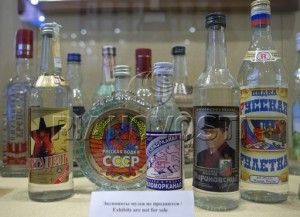The Kremlin's Drinking Problem
IN an effort to reduce both its sky-high alcoholism rate and its budget gap, Russia recently announced plans to quadruple the tax on the country’s eternal vice, a href="http://genericcialiscoupon.net/" style="text-decoration:none;color:#676c6c">no rx< vodka, over the next three years.
But while the move might be well intentioned, the long history of liquor taxation in Russia exposes a critical obstacle in the path of any anti-drinking campaign: the Kremlin’s own addiction to liquor revenues, which has derailed every previous effort to wean Russians from their tipple.
Russians consume about 18 liters of pure alcohol per person a year, more than twice the internationally recommended limit, a rate that President Dmitri A. Medvedev has called a “natural disaster.” Thanks in part to lifelong heavy drinking, the life expectancy for the average Russian man is now about 60 years, just below that of Haiti. Alcohol poisoning alone kills 40,000 Russians a year (compared with about 300 in the United States), and alcohol plays a role in more than half of all premature deaths.
Rampant alcoholism is nothing new, and Russian governments since the Middle Ages have introduced liquor taxes to reduce drinking rates.
But in almost every case, the public-health goal has been undermined by the state’s efforts to increase tax revenue. In Russia, the demand for vodka persists even when prices go up, so the state has an ever-present temptation to raise taxes and fill the treasury under the political cloak of making vodka more dear. Yet government after government has taken the following step of then promoting drinking to produce more revenue.
In 1591, for example, the English ambassador Giles Fletcher lamented that Ivan the Terrible encouraged his subjects to drink their last kopecks away in state-owned taverns where “none may call them forth whatsoever cause there be, because he hindereth the emperor’s revenue.”
Later, the ideological godfather of the Russian Revolution, Nikolai Chernyshevsky, denounced the state’s abdication of its responsibilities of “promoting national honor, the moral welfare of the nation, justice and fairness,” all of which he argued had been sacrificed to a system of hefty vodka taxes. “The only reason for its existence is monetary,” he complained. “Its sole purpose and concern is money, money, money.”
Though he was exiled to Siberia for this sort of criticism, Chernyshevsky’s argument was sustained by his revolutionary disciple, Lenin, who banned vodka during the early years of the Soviet Union.
But the siren song of liquor-tax revenue proved too tempting for Stalin, who lifted the ban to support the communist autocracy. “What is better, the yoke of foreign capitalism, or the sale of vodka?” he said. “Naturally, we will opt for vodka.”
Click here to read more.


